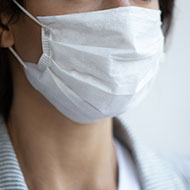
New evidence suggests coughs reach further than previously thought
The World Health Organization (WHO) is set to review guidance on whether more people should be wearing face masks during the COVID-19 crisis.
Under current WHO guidance, people only need to wear a face mask if they are coughing, sneezing or looking after someone with suspected COVID-19 infection. However, new evidence suggests that coughs can reach further than previously thought.
The study by scientists at the Massachusets Institute of Technology (MIT) found that coughs can reach 6m and sneezes up to 8m. Professor David Heymann, who is leading the expert review panel, told BBC News:
"The WHO is opening up its discussion again looking at the new evidence to see whether or not there should be a change in the way it's recommending masks should be used."
On Friday (10 Feb), England's deputy chief medical officer, Prof Jonathan Van-Tam, said: “There is no evidence that general wearing of face masks by the public who are well affects the spread of the disease in our society.”
But it has been argued that anything that may even help to partially 'flatten the curve' would be a welcome step.
In an interesting article published on US website The Medium, Sui Haang explores the scientific rationale on why we should all be wearing facial coverings. Referring to a study published in the journal Nature, which indicates that the disease is spread 'not via fine aerosols but large droplets', Haang concludes that surgical masks should be worn by everyone:
'If we are soon to yield to the pressure to loosen lockdowns and allow limited social interactions to revive the economy, then public masks should have a role and could facilitate a middle-of-the-road approach,' he writes.
His words echo the thoughts of Prof Lydia Bourouiba, the scientist who led the MIT study. She says that wearing masks would reduce the risk of infection, in particular within rooms that are poorly ventilated.
“What we exhale, cough or sneeze is a gas cloud that has high momentum that can go far, traps the drops of all sizes in it and carries them through the room,” she told BBC News. "So having this false idea of safety at one to two metres, that somehow drops will just fall to the ground at that distance is not based on what we have quantified, measured and visualised directly."
She continued: "Flimsy masks are not going to protect from inhaling the smallest particulates in the air because they do not provide filtration. But they would potentially divert the cloud that is being emitted with high momentum to the side instead of forward."
Face masks are commonly used in Asia and are now being recommended by the Centres for Disease Control (CDC) for use in the United States. The CDC says that, in light of the new evidence, cloth masks should be worn in public settings where other social distancing measures are hard to maintain, such in supermarkets or pharmacies.



 The RCVS has announced a new version of its 1CPD mobile app, with enhanced features for veterinary surgeons and veterinary nurses to record their continuing professional development.
The RCVS has announced a new version of its 1CPD mobile app, with enhanced features for veterinary surgeons and veterinary nurses to record their continuing professional development.